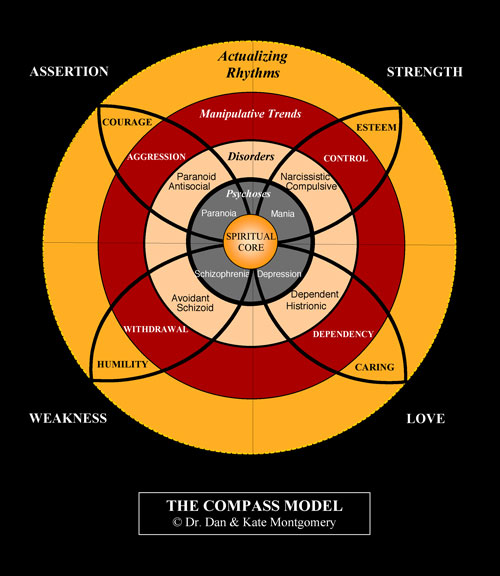
Self Compass Model
The Compass Model of personality brings insight into one’s personality and relationships by promoting psychological and spiritual growth.
THE LAWS OF PERSONALITY & RELATIONSHIPS
The consensus of interpersonal theory research holds that people’s recurring styles of intrapsychic and interpersonal dynamics possess two basic dimensions: affiliation and power. The Compass Model locates these two complementary polar axes, designated as the Love—Assertion and Strength—Weakness polarities, within a circle representing the self. Combined, they form the Self Compass.
At the actualizing level, people relate with a relatively high degree of self-awareness and interpersonal discernment. With the LAWS of personality as their guide, people know how to care for others without letting them take advantage. They diplomatically assert themselves if someone seeks to manipulate them, yet recover without succumbing to chronic defensiveness in return.

The innermost circle of the Compass Model symbolizes the spiritual core, an interior dwelling place of God’s image from which arises the grace-filled inspiration for an actualizing life. The actualizing individual’s spiritual core is primarily trustworthy because it radiates trust in God and oneself. Core trust, overall, outweighs core fear.
When free-floating fear holds too much sway, actualizing growth is held back. Core fear drives a person to avoid or exaggerate one or more compass points of Love or Assertion, Weakness or Strength. The consequences include manipulative trends and personality disorders, as well as psychoses. All are predicted by the Compass Model and correlate with the diagnostic categories of Axis II personality disorders in the Diagnostic and Statistical Manual of Mental Disorders.
Beyond its application in Christian counseling, the Compass Model is a valuable tool in pastoral ministry, Christian discipleship, and spiritual formation. Hope for transforming brokenness into personality health is the heart of the Compass Model. At once diagnostic and therapeutic, the Compass Model shows not only what blocks human growth, but also how the Holy Spirit can indwell the core of persons and guide them toward Christlike wholeness.
MONTGOMERY BOOKS ON THE COMPASS MODEL
The definitive books that develop the personality research, biblical theology, and personal application of the Compass Model may be ordered by clicking the titles:
COMPASS PSYCHOTHEOLOGY: WHERE PSYCHOLOGY & THEOLOGY REALLY MEET
“In Compass Psychotheology we finally have a bridge that connects personality theory with Trinitarian faith. The Compass Model describes Christ’s personality and reveals healthy personality dynamics. The Montgomery perspective eliminates the gap between theologians and clinicians, between conservatives and liberals, evangelicals and Pentecostals. All can use this model to facilitate growth toward individual wholeness, toward respectful and edifying communities, and deeper intimacy with God.”
— Linda Marten, Ph.D., Department of Biblical Counseling, Dallas Theological Seminary
CHRISTIAN PERSONALITY: A SELF COMPASS FOR HUMANITY
“People interested in a comprehensive Christian personality theory will find this book a helpful and refreshing guide for persons seeking wholeness.”
— Raymond F. Pendleton, Ph.D., Professor of Pastoral Care and Counseling, Gordon-Conwell Theological Seminary


